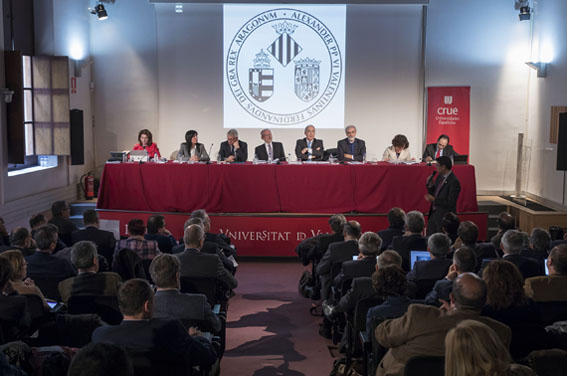The President of Crue Universidades Españolas demands to the Parliament a State Treaty that secures the future of university
- Press Office
- February 2nd, 2018

Roberto Fernández, the president of Crue Universidades Españolas and Principal of the University of Lleida, has presented to the General Assembly of Crue the general lines of the Political Agenda of the Institution. The convention took place last Friday at the Universitat de València. Esteban Morcillo, principal of the hosting university, had a seat in the presidential table.
The roadmap drew up by Roberto Fernández is divided in two main sections: strengthening the Spanish University System and strengthening the university communities. Among the key points of the roadmap, demanding a larger funding and developing policies that improve the current situation of the teaching and administrative staff stand out. Reducing university fees and increasing grants and aids for students are among the priorities.
During his intervention, the President of Crue presented to the deans of the 76 member universities the proposal that he will submit to university social councils, entrepreneurs and unions. It aims to achieve a consensus that demands prioritising the reform of the Spanish university to the Parliament. The final objective of this agreement is achieving “a State Treaty that can constitute a new law for universities” allowing universities “to hold a key position in the global strategy for the future of Spain. There will be no future in Spain if we don’t promote Spanish universities”, assured Roberto Fernández to the principals that were present.
Among the efforts to strengthen the Spanish University System, he indicated that faculties and the social councils need a higher political and administrative autonomy inside a state-wide framework that arranges the Spanish University System” indicated Roberto Fernández.
Regarding the improvement of the Spanish University System funding issue, the president of Crue indicated that “money does not fix everything. However, there are a few things that can be done without funds”. This is the reason why he asked for “stablishing basic state-wide criteria to secure public university funding. We shall take into account all the activities carried out by the university. He highlighted the duties of the teaching and researching staff, the GDP real growth assigned to RDI, establishing policies to achieve the private investment objectives and developing a patronage system. In terms of this last statement, Roberto Fernández regretted that “there was not a patronage law yet that permits undertaking it with guarantees and fiscal benefits”.
Finally, he offered a voluntary presentation of an annual report to las Cortes on the improvements and problems of the University.
Regarding the strengthening of university communities, the President of Crue demanded “reducing student fees, increasing the number of grants and removing barriers among qualifications superior to 50%” to defend the students’ interests and the opportunities equality. In addition, Roberto Fernández asked for “labour policies for graduates, minimising the effects of the incomplete implementation of Lomce, revising the conditions of school insurances and elaborating a new disciplinary regulation for students.
Roberto Fernández stated that developing staff policies will be set as an objective to “improve the assessment and recognition systems for teaching staff, define the researching trajectory of the universities, acquire full personnel replacement and settling temporary staff, as well as reserving vacancies for disabled researchers, teaching and researching staff and administrative staff. The President of Crue also adressed the development of “a new Internationalisation Strategy of Spanish Universities for 2015-2020” aiming to increase the number of foreign students as well as teaching and researching staff. We could achieve it by means of creating a bilingual degree offer”.
File in: Actes institucionals , Visites oficials
















